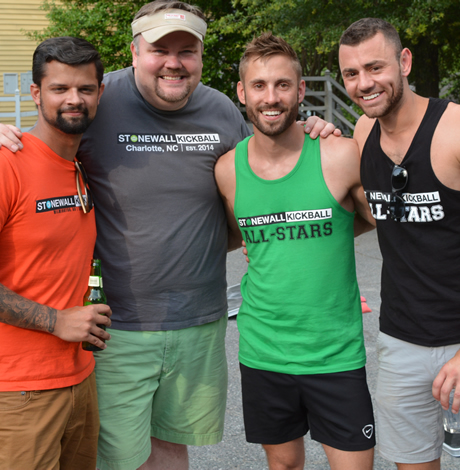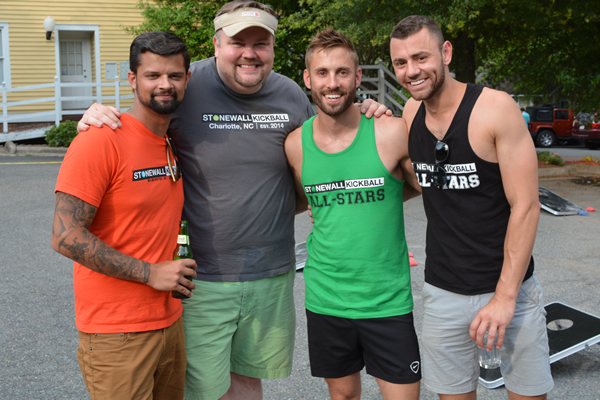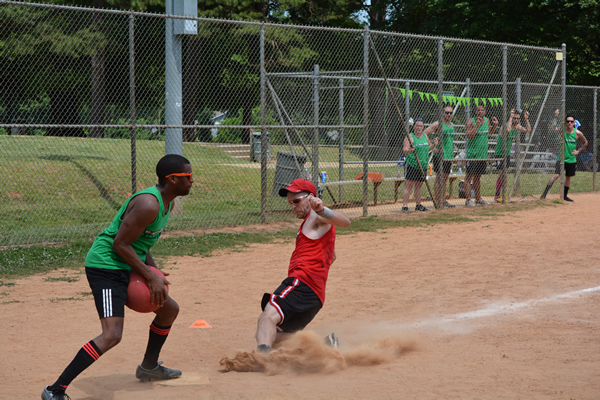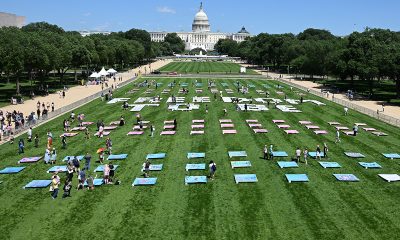Sports
New kickball league thriving in North Carolina
Stonewall Sports expands, finds eager players in unlikely places


Four commissioners of Stonewall Kickball in North Carolina (l-r), Frank Wolfgram, Jason Boone, Will Fisher and Jonathan Melton. (Photo courtesy of Boone)
With an estimated metropolitan area population of six million, D.C. is home to a large and thriving LGBT sports community. There are roughly 35 teams and clubs competing, playing and socializing together, usually outside of the traditional bar scene. It seems that every time a new league is formed, it is immediately filled to capacity. In 2015, Capital Pride Volleyball and Stonewall Billiards completed their first seasons and will have to consider expanding for their second seasons.
The success in D.C. of these leagues can be attributed in part to the sheer number of people here, the transient nature of the area and the progressive thinking of many residents. Many of the LGBT players are having their own sports renaissance, finding their way back to the sports they were bullied out of playing in their youth and trying new sports.
But what about the rural areas around the country where homophobia remains prevalent and where there are still no safe spaces for members of the LGBT community to play sports?
Is it possible for LGBT sports leagues to be formed that offer that safe space when the numbers aren’t there and the local community may not be ready for it?
In the smaller communities, it all begins at the grassroots level.
D.C.-based Stonewall Sports has created a prototype for LGBT sports leagues that has worked well for the five sports that it offers locally. The structure that Stonewall mandates includes organizational guidelines for the proposed sport, financial support to local charities and community outreach.
North Carolina became the target of the first Stonewall expansion effort and leagues are now in place in Raleigh, Charlotte, Greensboro and Wilmington.
Even with the Stonewall prototype, getting started and maintaining the momentum to keep the leagues running requires establishing a strong connection to the community. Raleigh and Charlotte were the first expansion cities in 2013 and the two smaller cities followed.
Stonewall Kickball-Greensboro started in the fall of 2014 with 70 players on five teams. There were some issues at the beginning with teams being too small and having to forfeit, but they expanded to 107 players in the second season this year.
With the Greensboro population at just over 250,000, to get those extra players, kickball commissioner Will Fisher started networking and going out and just talking to people. They are also competing to recruit players with a straight recreational kickball league in the area.
“There is not really a gay scene here,” says Fisher. “And we don’t have a lot of options recruiting from the colleges as most of them aren’t over 21.”
Greensboro ended up with a diverse group of kickball players — mostly gay, several straight players, some recovering from addictions and a mix of ages.
“This is a lot of people that didn’t hang out together that are playing a sport and getting along fine,” Fisher says.
Sponsorship for the teams in the league has come from varied sources such as an investment firm, a Cross Fit gym, a catering business and a straight bar that caters to gay clientele on Sunday nights. Even a dinnerware replacement company is on board. The players can be found helping out at their sponsor’s events, doing set-up and break-down and the financial benefactor of their efforts is the local LGBT community center, Guilford Green.
The Stonewall prototype is working so well for them, that they are considering taking over volleyball from an old parks and recreation league.
Fisher, who is from Sanford, N.C., didn’t play many sports growing up but was active in eventing, an equestrian sport.
“This is fun and I am really enjoying meeting people that I wouldn’t have met otherwise,” says Fisher. “Actually, I think I might know everyone in Greensboro now.”
The launch of Stonewall Kickball-Wilmington in the spring of 2015 proved to be an even tougher challenge as the population in Wilmington is just over 100,000 people.
“There is no gay community here and most of the LGBT people in town don’t want to go to the only gay bar,” says Frank Wolfgram, Wilmington Kickball commissioner. “It’s a small town and even though no one really knows each other, you still hear about everyone’s business.”
With no Pride events in the area, marketing was a key issue and word began to spread that a kickball league was forming. It was decided that it was necessary to have a few pick-up kickball games to see if everyone meshed. There were enough players to start a league — 60 players on five teams.
“When we were first getting ready to play, I was thinking to myself, ‘please let everyone be nice to each other,'” Wolfgram says. “And they were; it was mind-blowing. Everyone was clapping and being really supportive.”
Wolfgram is from Rochester, N.Y., and has been in Wilmington for five years. He played basketball and baseball growing up and says he has always been a sports fan. With the next season approaching, Wolfgram is already starting to wonder if they will come up with enough players to keep it going.
“I probably shouldn’t worry too much about it,” he says. “People enjoy getting muddy here.”
The lesson from starting these leagues in small cities was that the community plays an extra large part in the success of the venture. The typical game day is filled with kickball, cornhole, kids, dogs and food.
“You have to wonder if the community is ready for 60 gays and their allies to walk into a bar all wearing matching T-shirts,” says Martin Espinoza, co-founder of Stonewall Sports. “One thing to note is that the new leagues in North Carolina all have young leaders who are interested in helping the community.”
Another positive development is that despite the physical distance between the four cities, they are forging a new community together. They are playing games, holding events and offering support to one another. This weekend they will all come together to spend a day at the Wet n’ Wild water park in Greensboro. Ten people from Stonewall-D.C. will be there to join in the fun.
“It has been pretty amazing to watch this tight community form from four cities,” Espinoza says. “They are always trying to one up each other. Greensboro even had the straight female mayor come out for the first pitch.”

Sports
Attitude! French ice dancers nail ‘Vogue’ routine
Cizeron and Fournier Beaudry strike a pose in memorable Olympics performance

Madonna’s presence is being felt at the Olympic Games in Italy.
Guillaume Cizeron and his rhythm ice dancing partner Laurence Fournier Beaudry of France performed a flawless skate to Madonna’s “Vogue” and “Rescue Me” on Monday.
The duo scored an impressive 90.18 for their effort, the best score of the night.
“We’ve been working hard the whole season to get over 90, so it was nice to see the score on the screen,” Fournier Beaudry told Olympics.com. “But first of all, just coming out off the ice, we were very happy about what we delivered and the pleasure we had out there. With the energy of the crowd, it was really amazing.”
Watch the routine on YouTube here.
Italy
Olympics Pride House ‘really important for the community’
Italy lags behind other European countries in terms of LGBTQ rights

The four Italian advocacy groups behind the Milan Cortina Winter Olympics’ Pride House hope to use the games to highlight the lack of LGBTQ rights in their country.
Arcigay, CIG Arcigay Milano, Milano Pride, and Pride Sport Milano organized the Pride House that is located in Milan’s MEET Digital Culture Center. The Washington Blade on Feb. 5 interviewed Pride House Project Manager Joseph Naklé.
Naklé in 2020 founded Peacox Basket Milano, Italy’s only LGBTQ basketball team. He also carried the Olympic torch through Milan shortly before he spoke with the Blade. (“Heated Rivalry” stars Hudson Williams and Connor Storrie last month participated in the torch relay in Feltre, a town in Italy’s Veneto region.)
Naklé said the promotion of LGBTQ rights in Italy is “actually our main objective.”
ILGA-Europe in its Rainbow Map 2025 notes same-sex couples lack full marriage rights in Italy, and the country’s hate crimes law does not include sexual orientation or gender identity. Italy does ban discrimination based on sexual orientation in employment, but the country’s nondiscrimination laws do not include gender identity.
ILGA-Europe has made the following recommendations “in order to improve the legal and policy situation of LGBTI people in Italy.”
• Marriage equality for same-sex couples
• Depathologization of trans identities
• Automatic co-parent recognition available for all couples
“We are not really known to be the most openly LGBT-friendly country,” Naklé told the Blade. “That’s why it (Pride House) was really important for the community.”
“We want to use the Olympic games — because there is a big media attention — and we want to use this media attention to raise the voice,” he added.

Naklé noted Pride House will host “talks and roundtables every night” during the games that will focus on a variety of topics that include transgender and nonbinary people in sports and AI. Another will focus on what Naklé described to the Blade as “the importance of political movements now to fight for our rights, especially in places such as Italy or the U.S. where we are going backwards, and not forwards.”
Seven LGBTQ Olympians — Italian swimmer Alex Di Giorgio, Canadian ice dancers Paul Poirier and Kaitlyn Weaver, Canadian figure skater Eric Radford, Spanish figure skater Javier Raya, Scottish ice dancer Lewis Gibson, and Irish field hockey and cricket player Nikki Symmons — are scheduled to participate in Pride House’s Out and Proud event on Feb. 14.
Pride House Los Angeles – West Hollywood representatives are expected to speak at Pride House on Feb. 21.
The event will include a screening of Mariano Furlani’s documentary about Pride House and LGBTQ inclusion in sports. The MiX International LGBTQ+ Film and Queer Culture Festival will screen later this year in Milan. Pride House Los Angeles – West Hollywood is also planning to show the film during the 2028 Summer Olympics.
Naklé also noted Pride House has launched an initiative that allows LGBTQ sports teams to partner with teams whose members are either migrants from African and Islamic countries or people with disabilities.
“The objective is to show that sports is the bridge between these communities,” he said.
Bisexual US skier wins gold
Naklé spoke with the Blade a day before the games opened. The Milan Cortina Winter Olympics will close on Feb. 22.
More than 40 openly LGBTQ athletes are competing in the games.
Breezy Johnson, an American alpine skier who identifies as bisexual, on Sunday won a gold medal in the women’s downhill. Amber Glenn, who identifies as bisexual and pansexual, on the same day helped the U.S. win a gold medal in team figure skating.
Glenn said she received threats on social media after she told reporters during a pre-Olympics press conference that LGBTQ Americans are having a “hard time” with the Trump-Vance administration in the White House. The Associated Press notes Glenn wore a Pride pin on her jacket during Sunday’s medal ceremony.
“I was disappointed because I’ve never had so many people wish me harm before, just for being me and speaking about being decent — human rights and decency,” said Glenn, according to the AP. “So that was really disappointing, and I do think it kind of lowered that excitement for this.”
Puerto Rico
Bad Bunny shares Super Bowl stage with Ricky Martin, Lady Gaga
Puerto Rican activist celebrates half time show

Bad Bunny on Sunday shared the stage with Ricky Martin and Lady Gaga at the Super Bowl halftime show in Santa Clara, Calif.
Martin came out as gay in 2010. Gaga, who headlined the 2017 Super Bowl halftime show, is bisexual. Bad Bunny has championed LGBTQ rights in his native Puerto Rico and elsewhere.
“Not only was a sophisticated political statement, but it was a celebration of who we are as Puerto Ricans,” Pedro Julio Serrano, president of the LGBTQ+ Federation of Puerto Rico, told the Washington Blade on Monday. “That includes us as LGBTQ+ people by including a ground-breaking superstar and legend, Ricky Martin singing an anti-colonial anthem and showcasing Young Miko, an up-and-coming star at La Casita. And, of course, having queer icon Lady Gaga sing salsa was the cherry on the top.”
La Casita is a house that Bad Bunny included in his residency in San Juan, the Puerto Rican capital, last year. He recreated it during the halftime show.
“His performance brought us together as Puerto Ricans, as Latin Americans, as Americans (from the Americas) and as human beings,” said Serrano. “He embraced his own words by showcasing, through his performance, that the ‘only thing more powerful than hate is love.’”
-

 Theater5 days ago
Theater5 days agoMagic is happening for Round House’s out stage manager
-

 Baltimore3 days ago
Baltimore3 days ago‘Heated Rivalry’ fandom exposes LGBTQ divide in Baltimore
-

 Real Estate3 days ago
Real Estate3 days agoHome is where the heart is
-

 District of Columbia3 days ago
District of Columbia3 days agoDeon Jones speaks about D.C. Department of Corrections bias lawsuit settlement



















